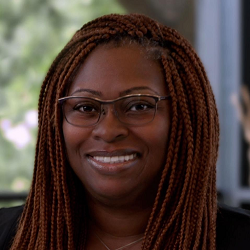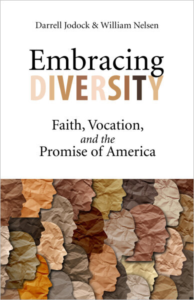 Embracing Diversity: A Book Review
Embracing Diversity: A Book Review
Dr. Arnita Walls
Former Chief Human Resource Officer, Luther Seminary (St. Paul, Minnesota)
Member, The Registry
Embracing Diversity: Faith Vocation and the Promise of America, 2021, by Dr. William Nelsen and Darrell Jodock
In their book, Rev. Dr. William Nelsen and co-author Dr. Darrell Jodock investigate the role of religion, faith, and spirituality in enhancing justice, equity, diversity, and inclusion (JEDI) within our communities. Through this book, the authors explore concepts such as the “Christian vocation,” and the call to love and to serve our neighbors and community. The writers also explore concepts of self-study—the willingness to be vulnerable and to listen, embrace, and learn from the experiences of others. In later chapters, the authors lean into the important role of the church in mobilizing communities to respond to racism and injustice and offer numerous strategic action steps that readers can take away to their own congregations and communities.
Since the murder of George Floyd nearly two years ago, there has been a global side eye on the United States and its law enforcement communities. Constant media attention on the perceived ritual coined “death by cop” shootings, seemingly taking place more abundantly in African American and Black communities, has become normalized in the minds of many. Rioting and protesting, and the targeting of members of specific religious and faith-based groups and members of the LGBTQ community, further divide our nation. In these times, many folk seek the opportunity to repair relationships and to heal through dialogue with their peers. Embracing Diversity: Faith, Vocation, and the Promise of America is an effective resource for those who seek to provoke critical conversations.
This book explains the importance and urgency for more justice, equity, diversity (spiritual, racial, and ethnic), and inclusion amongst people from all walks of life. The need exists to be a more pluralistic Christian society that loves all thy neighbors and not just the ones we like. God made us a promise which was for us to live life in full abundance. Meanwhile, America’s proudest saying has been In God We Trust, as printed on US currency. One of the best highlights of this book is the reiteration of the importance of how we can all live and be together if we embrace diversity and accept one another’s differences.

There are several chapters that give good examples of how differences can bring us all together when we fully and authentically participate in conversations in good faith. The anecdotal and professional experiences shared by the authors give an abundance of credibility and further underscore the importance of engaging with those that are from other communities. For example, meeting with other faith organizations, churches, and institutions to dialogue, share stories and exchange knowledge about the different lived experiences and cultures.
After reading this book, it is clear that the church plays an integral part in mobilizing to embrace diversity by returning to its evangelistic and outreach roots. In chapter 7, the authors explain different strategies and techniques that would be nimble enough to see the evolution of diverse communities coming together. I would encourage readers to take notice of how the authors describe the churches’ role as an ally to marginalized groups. I thought this was important to mention as the book is very thorough when describing the role of society and its members, the state of the union, and more importantly the church.
The book makes a compelling argument that for those of faith it is important to investigate and question the roots of our faith and how we interact with our colleagues who may be different than us. In that way, this book calls on us to love each other in a profound way that respects our differences. In chapters 6 and 7, the authors share supportive examples and testimonies that are applicable to institutions of faith but also institutions of higher education. These examples include adaptable strategies and recommendations that can lend support in the diverse community spaces that we encounter on a regular basis, most notably community spaces such as Justice, Equity, Diversity, and Inclusion (JEDI), Diversity, Equity, and Inclusion (DEI) and Black, Indigenous, People of Color (BIPOC). This book explains how and why putting spiritual, faith, and Christian values first is what will enable us to truly embrace diversity and reap the true benefits of the Promised Land. Furthermore, this book does a great job of investigating instances of conscious and unconscious bias that we may encounter in our professional work, in our daily lives, and in our religious communities.
Lastly, this book touches on all aspects of organizational development needed in both the church and higher education settings. It is a gem of a reference tool for Human Resource and other institutional leaders to have in their toolbox. The authors conclude their book with an analysis of joy, a celebration of diversity and inclusion which moves us from a sentiment of tolerance of the beliefs of others to one of deep appreciation. The writers call upon us to not give up, but to be uplifting and inspiring. This book encourages us to seek out new opportunities to embrace our faith as we do the hard work. More importantly, this book encourages a fearless dialogue with our peers. Embracing Diversity is a must read.
HIRE AN INTERIM
Searching for an Interim?
Please contact us for more information.

